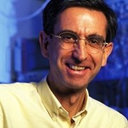
Philip Cunningham writes,
I just happened to check quantum physicist and philosopher Antoine Suarez‘s youtube channel. He loaded a new video a few months ago after being silent for a few years.
Quantum nonlocal correlations come from outside space-time, they cannot be explained exclusively by material links.
If the experimenter has free will, then there is free will behind the quantum phenomena.
The physical reality requires an author with free will.
The world is speakable because it is spoken.
Quantum physics: Accessing the invisible through the visible More.
Also by Suarez:
What Does Quantum Physics Have to Do with Free Will? – By Antoine Suarez – July 22, 2013
Excerpt: What is more, recent experiments are bringing to light that the experimenter’s free will and consciousness should be considered axioms (founding principles) of standard quantum physics theory. So for instance, in experiments involving “entanglement” (the phenomenon Einstein called “spooky action at a distance”), to conclude that quantum correlations of two particles are nonlocal (i.e. cannot be explained by signals traveling at velocity less than or equal to the speed of light), it is crucial to assume that the experimenter can make free choices, and is not constrained in what orientation he/she sets the measuring devices.
To understand these implications it is crucial to be aware that quantum physics is not only a description of the material and visible world around us, but also speaks about non-material influences coming from outside the space-time… Big Questions Online
Antoine Suarez “cites the Free Will Theorem of John Conway and Simon Kochen as making free will an axiom (within quantum mechanics), without which science itself could not proceed.” Information Philosopher
and relevant thinkers:
The free will theorem of John H. Conway and Simon B. Kochen…
Since the free will theorem applies to any arbitrary physical theory consistent with the axioms, it would not even be possible to place the information into the universe’s past in an ad hoc way. The argument proceeds from the Kochen-Specker theorem, which shows that the result of any individual measurement of spin was not fixed (pre-determined) independently of the choice of measurements. Information Philosopher
“The Kochen-Speckter Theorem talks about properties of one system only. So we know that we cannot assume – to put it precisely, we know that it is wrong to assume that the features of a system, which we observe in a measurement exist prior to measurement. Not always. I mean in a certain cases. So in a sense, what we perceive as reality now depends on our earlier decision what to measure. Which is a very, very, deep message about the nature of reality and our part in the whole universe. We are not just passive observers.” Anton Zeilinger – Quantum Physics Debunks Materialism – video (7:17 minute mark)
See also: Twisted light can carry arbitrarily large amounts of information –a find friendly to theism?